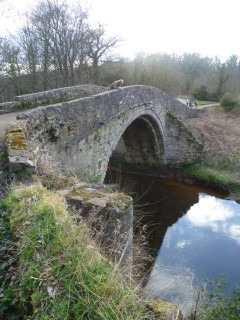Tune of the Day: Dalkeith Maiden Bridge

This hornpipe is taken from the 3rd volume of James Aird's Selection of Scotch, English, Irish and Foreign Airs, published in 1788. It is named after an ancient bridge built on the site of a ford on the South Esk river, not far from the site where once stood the Abbey of St. Mary, Newbattle. The Rev. J.C. Carrick, writing in his The Abbey of S. Mary Newbottle (1908), explains:
A minor road passed across the park through the monastic village, and over the Maiden Bridge towards Dalkeith, in all probability. A vigorous controversy has been waged over the name of this bridge, which, crossing the South Esk about a mile from the Abbey, so picturesquely reminds one of the Brig o' Doon in Ayrshire. Various antiquarians have held various views about it; but possibly the bridge, whether the work of Roman soldiers or not,—and there was a Roman camp on the hill,— was baptised the “Maiden Brig” after the great historical event so beautifully depicted in the Italian painting which adorns one of the mantelpieces in the drawing-room of the present mansion. Robert Burns sets one of his sweetest songs to the air, “Dalkeith's Maiden Bridge”.
The Robert Burns song that Carrick alluded to is “Sae Far Awa” (sometimes called “My native land, sae far awa”), printed in Johnson's Scots Musical Museum (1796). (Photo by Kim Traynor)
